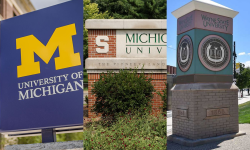Michigan education programs are training teachers, but hundreds aren’t passing the licensing exam

"Michigan education programs are training teachers, but hundreds aren’t passing the licensing exam was originally published by Chalkbeat, a nonprofit news organization covering public education. Sign up for their newsletters here: ckbe.at/newsletters"
Hundreds of prospective teachers attended training programs in Michigan but failed the licensing exam to become a teacher.
That’s according to a new report that asks whether the programs and the state officials that oversee them are doing enough to ensure that the students make the leap from training to the classroom.
Aspiring Michigan educators must pass a licensure exam in the subject they want to teach before taking over a classroom. Yet the 46 teacher training programs in the state vary broadly in how much they help students pass the educator licensing exam.
Related:
- Even as COVID wanes, fewer low-income students enroll in Michigan colleges
- Detroit schools found a way to attract teachers: Pay them more
- Michigan’s teacher of the year looks for silver linings as COVID fades
All told, 7 percent of prospective teachers — 332 total — never passed the exam for elementary school teachers between 2015 and 2018, according to previously unreleased data published by the National Council on Teacher Quality, a nonprofit advocacy group. But failure rates for more than a dozen training programs were higher than 20 percent. In a handful of programs, most of which are based at colleges and universities, more than 1 in 5 students took the exam three times or more — at $129 each time.
The report comes as many K-12 schools in Michigan struggle to recruit and retain educators. Students in low-income communities are especially likely to learn from inexperienced teachers or long-term substitutes, which has a negative effect on their learning.
Stagnant pay and poor working conditions are mostly to blame for problems in the state’s teacher pipeline, experts say. Indeed, enrollment in the programs has dropped sharply in recent years, a sign of waning interest in the profession.
But advocates insist that the programs have a role to play in supplying K-12 schools with educators — and that includes helping them pass the licensure exam.
“Sounds like a handful of the schools really need to step up their game,” said Sen. Jim Runestad, a Republican member of the Education and Career Readiness Committee. “I’d love to do anything I can do on my end to advocate that these schools either do a better selection process or that they’re spending an adequate amount of time educating to make sure students pass” the exam.
NCTQ says it requested pass rate data in every state and has so far received it from Michigan, 37 other states and the District of Columbia.
Michigan uses a custom-designed certification exam from the testing company Pearson, so its pass rate data is not comparable with data from other states.
The group published pass rates for students’ first attempts at the licensing test as well as for their best attempts between 2015 and 2018.
Universities with the highest first attempt pass rates include the University of Michigan (94 percent), Michigan State University (87 percent), Saginaw Valley State University (86 percent), and Grand Valley State University (83 percent). The statewide average was 79 percent.
The programs with the lowest first attempt pass rates included Oakland University (70 percent), Ferris State University (68 percent), Wayne State University (61 percent), and University of Michigan Dearborn (59 percent).
Christopher Burke, interim chair of the education department at the University of Michigan Dearborn, declined to comment on the NCTQ report.
“In 2019 we were reaccredited by CAEP, you can read our accreditation report here,” he said in a statement. “Based upon MDE standards, we are also currently in the process of reviewing our curriculum to ensure that it continues to be aligned with the MDE’s new teacher professional standards.”
This report is the latest accountability push by the advocacy group, which stirred controversy in 2013 after it published rankings of teacher training programs that some advocates felt were incomplete.
Teacher training programs should be required to routinely post detailed data on how their students fare on licensure exams, said Kate Walsh, NCTQ president.
“You as a prospective teacher have a right to know if this institution is going to get you a teaching license,” she said. “Because that’s what they’ve told the state they’re going to do.”
Annual reports published by the Michigan Department of Education show how many teachers pass each of the more than 60 licensure exams in different subject areas, as well as overall pass rates for students from each teacher preparation program.
But those reports don’t offer the same detail as the NCTQ data, such as how many times it takes students from particular programs to pass the exam and how many students of color are passing the exam.
Still, an MDE spokesperson said the state has held underperforming teacher training programs accountable. Each program receives an annual rating based partly on licensure exam scores which can result in programs being labeled “low-performing.”
Lake Superior State University, University of Michigan Flint and Concordia University stopped training teachers in particular subjects as a result of state oversight between 2014 and 2018, said Bill DiSessa, MDE spokesman.
Other teacher training programs closed entirely as a result of state oversight, he said, including Finlandia University in 2012, Olivet College in 2015, and the University of Detroit Mercy in 2019.
Chalkbeat is a nonprofit news site covering educational change in public schools.
Michigan Education Watch
Michigan Education Watch is made possible by generous financial support from:
Subscribe to Michigan Health Watch
See what new members are saying about why they donated to Bridge Michigan:
- “In order for this information to be accurate and unbiased it must be underwritten by its readers, not by special interests.” - Larry S.
- “Not many other media sources report on the topics Bridge does.” - Susan B.
- “Your journalism is outstanding and rare these days.” - Mark S.
If you want to ensure the future of nonpartisan, nonprofit Michigan journalism, please become a member today. You, too, will be asked why you donated and maybe we'll feature your quote next time!





